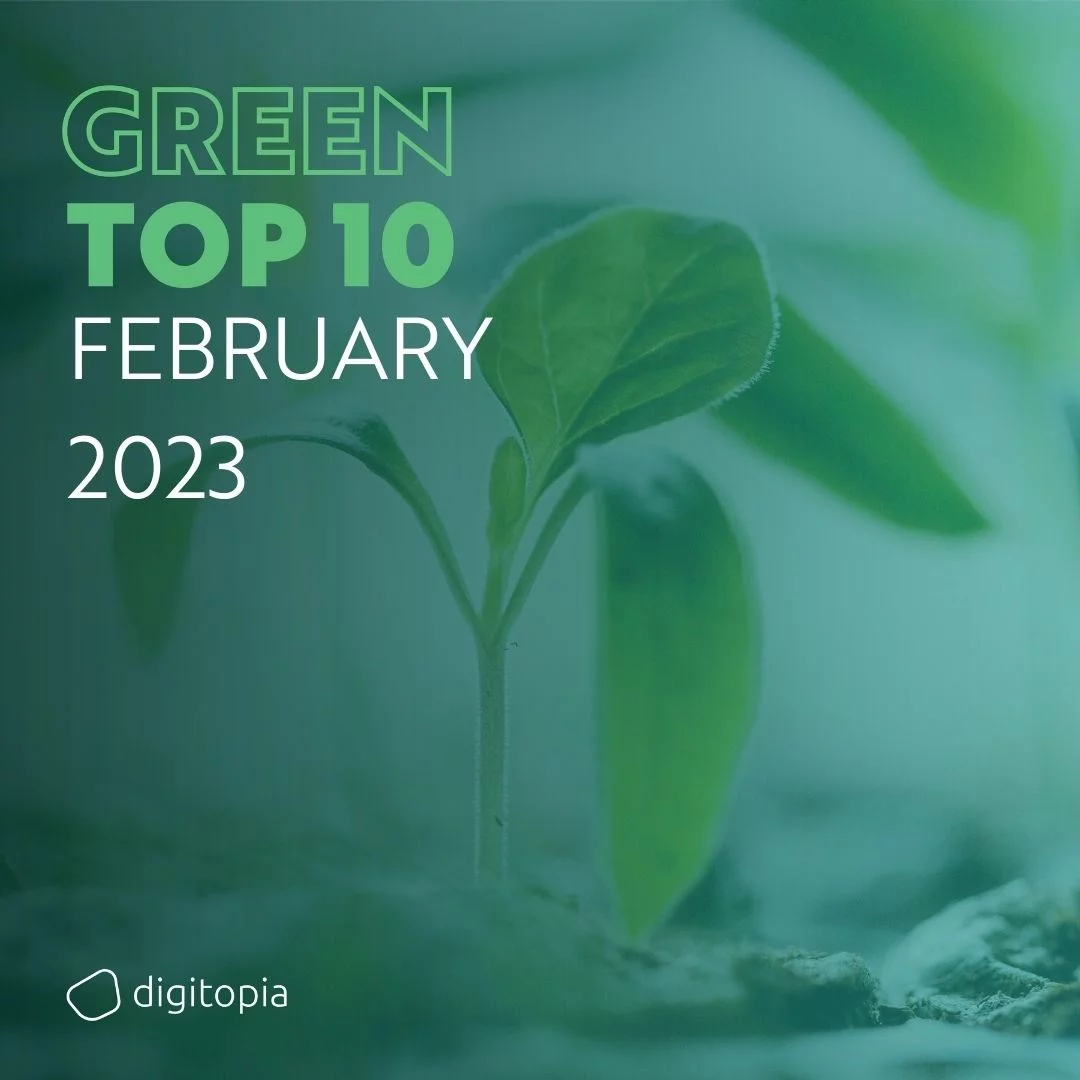
1. ‘Super-tipping points’ could trigger cascade of climate action
The World Economic Forum has released a report which highlights three “super-tipping points” for taking action on climate change that could result in a widespread transition to a decarbonized global economy. The report states that small policy changes in the electric car industry, plant-based meat alternatives, and green fertilizers would drive growth in these sectors, leading to additional benefits in related industries such as energy storage and aviation. The tipping points will occur when zero-carbon options become more cost-effective than traditional high-carbon solutions. These three tipping points could reduce emissions in sectors responsible for 70% of the world’s greenhouse gas emissions, providing “realistic hope” for a quick transition to a green economy.
Source: The Guardian
2. ESG accounts for 65% of all flows into European ETFs in 2022
In 2022, ESG (Environmental, Social, and Governance) ETFs made up 65% of the net inflows into European ETFs, despite recent underperformance. These ETFs brought in €51 billion over the year, from the total of €78.4 billion, which was a decline from the previous year’s figure of €160 billion. Despite their recent subpar performance, ESG ETFs now account for 18.8% of total assets, worth €249 billion, in Europe. As the popularity of ESG continues to rise in Europe, allegations of “greenwashing” and anti-ESG sentiment are also becoming more prevalent, particularly in the US. In comparison, only about 1% of ETF holdings in the US are related to ESG, while the figure is 20% in Europe.
Source: Financial Times
3. Danone lawsuit could be test case for new war on plastics
Danone, a leading food and beverage company, is facing legal action due to its excessive use of plastic in packaging and failure to follow environmental policies. The lawsuit, filed under the “Duty of Vigilance” law, is calling for Danone to map the impacts of its plastic use and create a plan to reduce its plastic footprint. Danone denies the accusations but is committed to reducing plastic use and has set a goal of 100% recyclable/reusable/compostable packaging by 2025. The company has also achieved a 12% reduction in global plastic use between 2018-2021
Source: Financial Times
4.What will the increased financialization of carbon do for decarbonization?
The London Stock Exchange Group’s (LSEG) introduction of a new exchange for carbon credits represents a significant step towards decarbonizing the financial industry. Despite the growth of the voluntary carbon market, valued at $2 billion in 2021 and projected to reach $50 billion by 2030, this business-oriented approach to climate change has not produced the desired outcomes. LSEG’s new exchange seeks to offer corporations access to offsets and provide investors with exposure to a stable supply of carbon credits, all while ensuring a positive environmental impact through increased transparency and alignment with the FTSE Russell’s Green Revenues Classification System.
Source: GreenBiz
5.Revealed: more than 90% of rainforest carbon offsets by biggest certifier are worthless, analysis shows
A new investigation has found that the carbon offsets approved by Verra, the world’s leading carbon standard, and used by companies such as Disney, Shell, and Gucci, are largely ineffective and may even make the global heating crisis worse. The investigation, conducted by The Guardian, Die Zeit, and SourceMaterial, found that over 90% of Verra’s rainforest offset credits, the most commonly used by companies, are likely to be “phantom credits” and do not represent genuine carbon reductions. The findings of the study, which has been disputed by Verra, will raise questions for companies relying on offsets as part of their net-zero strategies. The investigation also raised concerns about human rights issues in at least one of Verra’s offsetting projects and found that just a few projects showed evidence of deforestation reductions.
Source: The Guardian
6. Equinor and RWE to build hydrogen supply chain for German power plants
Equinor and RWE plan to create a supply chain for low-carbon hydrogen, which will enable Germany to reduce its reliance on coal and decrease its CO2 emissions. They aim to construct power plants in Germany that will initially be powered by natural gas and eventually by hydrogen produced in Norway at shared production facilities. The cost of the entire supply chain may reach tens of billion euros, with the pipeline alone costing 3 billion euros. If successful, it would be the first of its kind globally and have the capability to transport 4 million tonnes of hydrogen per year, equivalent to 135 terawatt hours of energy.
Source: Reuters
7. An Energy Crisis Is Seeping Into South Africa’s Food Supply
The energy crisis in South Africa is causing widespread disruption, affecting food and water supplies, and is putting a strain on the country’s infrastructure. Power cuts have forced factories, including chicken farms, to pause operations, which has caused an increase in production costs. The crisis is also affecting the country’s agricultural sector, causing crop irrigation, processing, and storage problems. Smaller businesses are struggling to adapt to the situation, while larger retailers such as Shoprite and Woolworths have increased their investment in renewable energy. The country’s reliance on diesel-powered generators is not sustainable, as Eskom has repeatedly exhausted its budget to buy more diesel, causing increased costs for companies such as Shoprite. The energy crisis is putting pressure on the South African economy and could lead to a recession.
Source: Bloomberg
8. New solar-powered technology can transform plastic waste into sustainable fuels and cosmetics
A group of researchers at the University of Cambridge have created a cutting-edge, solar-powered system that converts waste plastic and greenhouse gases into two eco-friendly fuels, syngas and glycolic acid. This system presents a substantial solution to plastic waste and a crucial advancement towards a sustainable circular economy. The technology merges catalysts into a light absorber and can produce diverse outcomes based on the specific catalyst employed. This system is considered a potential “change-maker” in the effort to achieve a circular economy and tackle the challenges of plastic pollution and greenhouse gas emissions.
Source: Euronews
9. Why some of the biggest names in tech and auto are teaming up on virtual power plants
A coalition of companies and organizations have formed the Virtual Power Plant Partnership (VP3) to develop standards and policies for virtual power plants (VPPs). VPPs are made up of electric vehicles, home solar systems, smart thermostats, and other appliances that can act as backup power sources and adjust their energy use to reduce stress on the electricity grid. The coalition, initially funded by Google Nest and General Motors, and led by the non-profit RMI, will prioritize research, push for policies to promote the growth of VPPs and develop industry-wide best practices and standards. The next 12 to 24 months are considered critical for the development of virtual power plants and the energy transition, and VP3 aims to ensure that the energy transition continues to progress smoothly.
Source: The Verge
10. Rare-Earth Find in Sweden Lifts Hope for Shift Toward Clean Energy
The largest deposit of rare-earth elements has been discovered in Sweden and offers hope for Europe’s transition to renewable energy and reducing its dependence on China, the world’s largest supplier of these critical minerals. Swedish state-owned mining company LKAB says that the rare-earth elements in the deposit could be used to produce permanent magnets, which are components of electric vehicle motors and wind turbines. The deposit will likely take 10 to 15 years or more to develop, but it has the potential to become a key component in enabling the green transition. The European Commission plans to propose legislation to boost the EU’s provisions of these critical raw materials this year. LKAB plans to apply for an exploitation concession later this year, and the deposit is estimated to hold one million tonnes of rare-earth oxides. However, there are concerns from the Sami indigenous population about the impact of mining on their land and culture.
Source: WSJ

